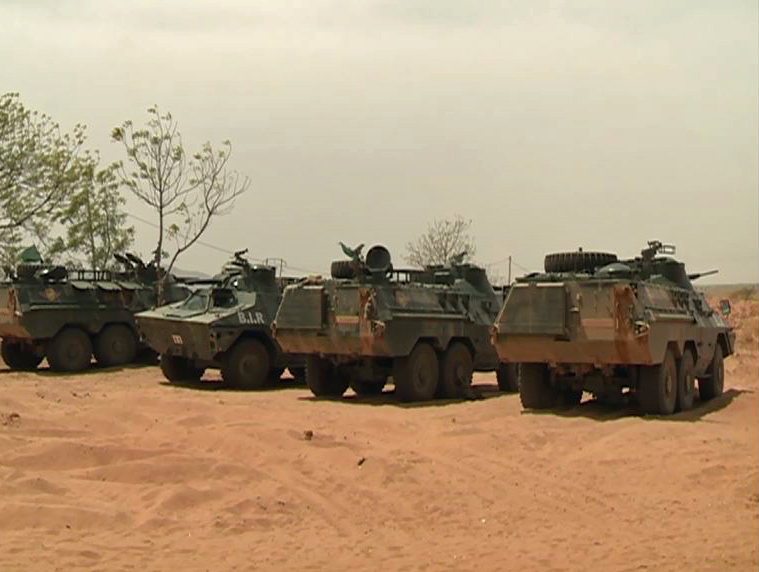
Military vehicles of the BIR in Far Northern Cameroon 2019
“Officials in northern Cameroon have called on neighboring Chad and Nigeria to deploy additional troops to their border to counter attacks by the Islamist group.”
On 1 June, the French-language Cameroonian publication actucameroun.com reported on Cameroon’s call for its neighbors, Chad and Nigeria, to bolster troop deployments to their mutual border with Cameroon to stop attacks from Boko Haram. This came after Cameroon’s Far North region governor claimed hundreds of Boko Haram members infiltrated the Cameroonian border. According to the article, Cameroonian President Paul Biya responded to the escalating Boko Haram attacks along Cameroon’s Lake Chad shoreline by ordering an emergency meeting of military and government officials in the country’s north to develop strategies to prevent further Boko Haram incursions.
The article claims that Boko Haram attacks in northern Cameroon are increasing. The group abducted six civilians in Amchidé and shot and wounded another civilian. The attack resembled those of the late Abubakar Shekau’s faction, which is notorious for harassing civilians even more than the Islamic State in Iraq and Syria (ISIS)-affiliated faction.[i] History suggests attacks around Lake Chad will escalate without sufficient regional coordination to counter both factions.[ii][iii] The second excerpted article in Nigeria’s premiumtimes.ng reported on 18 August a promise from Public Information Officer of the Multinational Joint Task Force. This force includes Nigerian, Cameroonian, Chadian, and Nigerien troops and is based in N’djamena, Chad. The officer asserted that the force’s resolve to combat Boko Haram would be enduring.
Sources:
“Des responsables du nord du Cameroun auraient demandé à leur gouvernement et au Nigeria et au Tchad de déployer des troupes supplémentaires à leur frontière (Officials in northern Cameroon reportedly asked their government and Nigeria and Chad to deploy additional troops to their border),” actucameroun.com (French-language publication covering Cameroonian affairs from a neutral perspective), 1 June 2023. https://actucameroun.com/2023/06/01/des-responsables-du-nord-du-cameroun-auraient-demande-a-leur-gouvernement-et-au-nigeria-et-au-tchad-de-deployer-des-troupes-supplementaires-a-leur-frontiere/?_unique_id=64785f3f48c1b
As Boko Haram attacks intensify, we have learned that officials in northern Cameroon have called on neighboring Chad and Nigeria to deploy additional troops to their border to counter attacks by the Islamist group. The governor of the Far North region of Cameroon, which shares a border with Chad and Nigeria, revealed that hundreds of heavily armed radical Islamists infiltrated the dangerous Lake Chad Basin region and attacked, looted, and spread fear.
President Paul Biya ordered officials and troops in Cameroon’s Far North region to hold an emergency crisis meeting and to ensure that the armed Islamist extremists infiltrating the troubled Lake Chad region are thwarted.
In context of this security threat, we learn that the leaders of northern Cameroon do not intend to remain only at their border but have asked the neighboring countries, Nigeria and Chad, to also deploy men at their border in order to capture the terrorists.
“MNJTF Eliminates Boko Haram Fighters in Cameroon Axis,” 18 August 2023, premumtimes.ng (Abuja-based publication noted for investigative journalism that is critical of the government) https://prnigeria.com/2023/08/18/mnjtf-eliminates-boko/
On August 17, 2023, the troops of the Multinational Joint Task Force (MNJTF) Sector 1 in Cameroon successfully intercepted remnants of the Boko Haram terrorists who were scavenging for logistics in Hile Halifa on the fringes of Lake Chad, Far North Cameroon. This successful effort signifies another major setback for the terrorist group, which continues to threaten peace and stability in the regionThe MNJTF Sector 1 continues to strengthen its resolve in dismantling Boko Haram and restoring stability in the affected areas.
Notes:
[i] Perhaps no one spoke in more detail about Shekau’s harming civilians than his own rival subcommanders. They accused him of, among other brutalities, killing displaced persons who had no other way of finding food or shelter but to seek the support of “Christian” aid organizations and the government in refugee shelters and camps. However, Shekau considered this to be “apostasy.” In addition, Shekau ordered the killing of anyone who opposed him or even disagreed with him, which earned him—and Boko Haram more generally—a notorious reputation among the civilians of northeastern Nigeria. This caused the group to lose support to the consternation of Shekau’s less radical subcommanders. See Nur, Mamman, ‘Exposé: An Open Letter to Abubakar Shekau’, in Abdulbasit Kassim, and Michael Nwankpa (eds), The Boko Haram Reader: From Nigerian Preachers to the Islamic State, Oxford University Press: Oxford, 2018.
[ii] For more on regional cooperation to counter Boko Haram, see; Jacob Zenn, “Multinational Joint Task Force Lauds Counterterrorism Success Against Boko Haram,” OE Watch, 05-2023. https://fmso.tradoc.army.mil/2023/multinational-joint-task-force-lauds-counterterrorism-success-against-boko-haram/
[iii] The Multinational Joint Task Force (MNJTF) is the entity through which Lake Chad states, including Nigeria, Cameroon, Chad, and Niger, have intended to boost their “capacity by better sharing plans and intelligence, committing troops for longer operations and improving troops’ human rights compliance.” However, these states have resisted fully integrating their forces into the MNJTF, which may have contributed to the MNJTF’s lack of capacity to eliminate or significantly reduce Boko Haram attacks or border incursions around Lake Chad. See International Crisis Group, “What Role for the Multinational Joint Task Force in Fighting Boko Haram?,” Report #291, July 7, 2020. https://www.crisisgroup.org/africa/west-africa/291-what-role-multinational-joint-task-force-fighting-boko-haram
Image Information:
Image: Military vehicles of the BIR in Far Northern Cameroon 2019
Source: Moki Edwin Kindzeka (VOA), https://commons.wikimedia.org/wiki/File:Military_vehicles_of_the_BIR_in_Far_Northern_Cameroon_2019.jpg
Attribution: (CC x 2.0)

